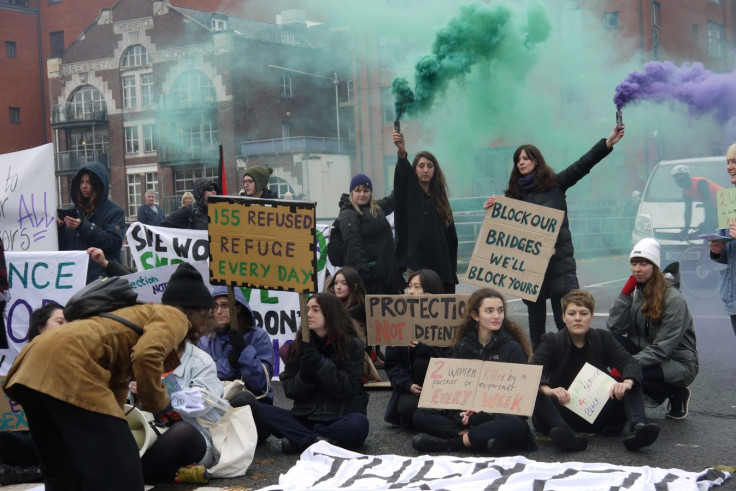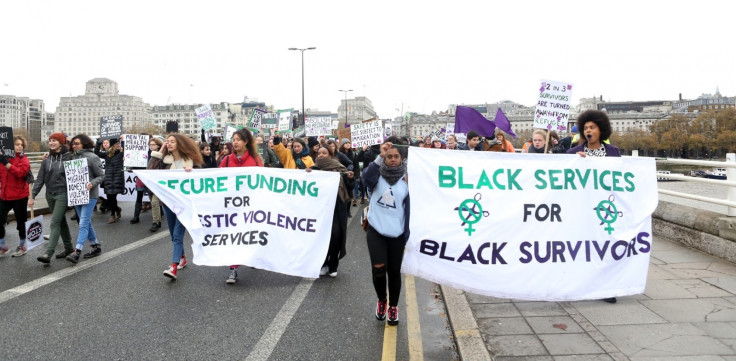Women are dying because of domestic refuge cuts - that's why Sisters Uncut are blocking bridges
Ahead of the Autumn Statement, we demand a secure funding plan for domestic violence services.
Our government is cutting funds for domestic violence refuges for vulnerable women – that's why Sisters Uncut blocked bridges across the UK
At the Conservative Party conference earlier this year, Theresa May set out her vision for government: Promising to 'build bridges' while her political opponents 'build barriers'.
Keen to rebrand her party as for the many and not the few, she claimed the Tories will set themselves apart by 'tackling unfairness and injustice'. At the heart of her narrative is the idea you only really help people if you let them help themselves. What May and many other ministers fail to understand is that in a society where empowerment is so closely intertwined with privilege, for many people this simply isn't an option.
On Sunday, Sisters Uncut coordinated protests to block bridges in London, Newcastle, Glasgow and Bristol. We blocked bridges to symbolise how the government is blocking domestic violence survivors' bridges by failing to provide adequate funding for support services. Ahead of this week's Autumn Statement, we demand a strategic, secure funding plan for domestic violence services. Six years of austerity have taken their toll. After cuts of £4.1 bn, councils have endured a 56% reduction in capacity, placing a stranglehold on local domestic violence services.
If Theresa May really wanted to 'build bridges', she would be doing more than providing a temporary £20m cash pot for domestic violence services to bid for. This short term funding model is wholly inadequate, and will have devastating effects on survivors who have already had their bridges blocked by the austerity measures May voted in. Domestic abuse cases make up about one in three violent crimes with injury. Refuges are now forced to turn away 2 out of 3 domestic violence survivors seeking safety, despite this being a time when victims are at the highest risk of domestic homicide.

Domestic violence services, which are already depleted, risk closure – and are now being forced to compete with each other for funding. We believe that safety is not a luxury, and that freedom from violence should not be preserved for the privileged.
Part of the problem is what is known as the 'shadow state': Private companies awarded public sector contracts. Invariably, these contracts go to the lowest bidder. In the case of domestic violence, this means women's lives are given to the lowest bidder. Without specialist expertise, the companies who tend to land them are woefully inept.

One prime example of this is private security firm G4S. Though they have had allegations of racism made against them in the past, earlier this year the firm was awarded a contract for the Equality Advisory and Support Service (EASS), a discrimination helpline. It is difficult to imagine a more ill-conceived appointment, or a worse use for public funds. By dismantling the state, the government undoes years of dedicated work and expertise from specialist services, while allowing their place to be filled by private companies motivated by profit.
When it comes to survivors with insecure immigration status, it is clear where the government's priorities lie. There was something of a disconnect between May's speech at the Tory conference and her actions while acting as Home Secretary. Particularly galling was May's use of BME statistics to signal an awareness of discrimination, in the same speech during which she blamed unemployment in the UK on 'low-skilled immigration'. There was little regard for tackling 'unfairness or injustice' when May oversaw the deportation of women and girls to their countries of origin when they risked domestic violence, forced marriage or FGM, or in the degrading treatment of LGBT women forced to disclose intimate details of their sexual history in order to secure immigration status.
With 'no recourse to public funds', survivors with insecure immigration status are unable to access domestic violence services. If they report the abuse to the police, they risk deportation, homelessness or death. We stand with our migrant sisters and reject the government's deliberate scapegoating of immigrants to serve political ends. Provisions must be made for domestic violence survivors regardless of immigration status.
4 out of 5 Black and Minority Ethnic survivors are turned away from refuges. As cuts deepen, there are fewer bridges to safety for BME survivors. When trying to engage with services not designed with them in mind, BME, non-binary people and women risk racist discrimination. Sisters Uncut are calling for the long term funding of specialised services for BME survivors, trans survivors, disabled survivors and non-binary survivors. For all survivors who are desperate to flee the daily threat of domestic violence and live in safety.
The need for specialist services has never been more pressing.
Sisters Uncut is a mass movement of women and non-binary people campaigning against cuts to domestic violence services. Sisters was formed by London domestic violence support workers and survivors in 2014, and is blossoming into a national campaign with thousands of members.
© Copyright IBTimes 2025. All rights reserved.






















